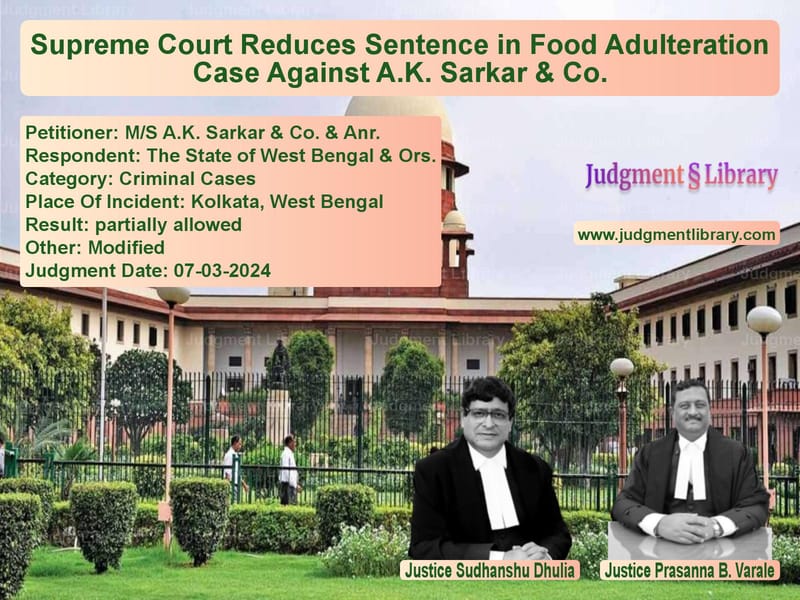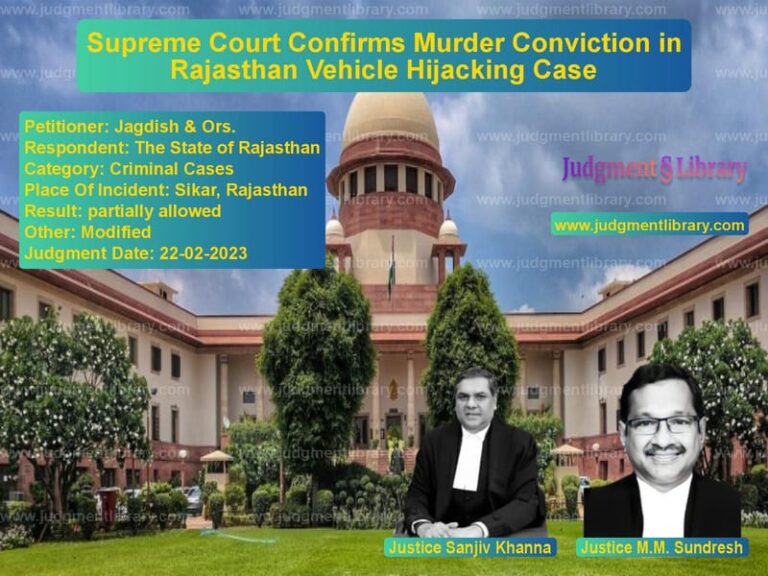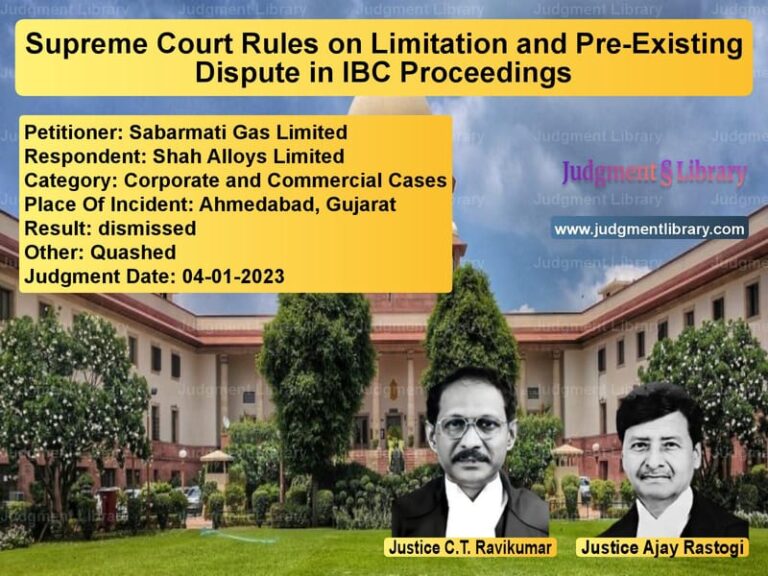Supreme Court Reduces Sentence in Food Adulteration Case Against A.K. Sarkar & Co.
The Supreme Court of India recently delivered a significant judgment in the case of M/S A.K. Sarkar & Co. & Anr. vs. The State of West Bengal & Ors., addressing food safety violations and sentencing guidelines under the Prevention of Food Adulteration Act, 1954. The Court upheld the conviction but reduced the sentence of the accused based on evolving legal standards.
Background of the Case
The case originated from an inspection conducted on December 6, 2000, by a Food Inspector at the premises of A.K. Sarkar & Co., located at 71, Biplabi Rash Behari Basu Road, Kolkata. The inspector collected samples of sugar-boiled confectioneries from the shop/godown for laboratory testing.
While the samples were not found to be adulterated, they were deemed misbranded because the packaging failed to display:
- The complete address of the manufacturer.
- The date of manufacturing.
Based on this violation, the inspector filed a complaint under Section 16(1)(a)(i) read with Section 7 of the Prevention of Food Adulteration Act, 1954 (PFA Act).
Key Legal Issues
- Whether the accused were responsible for misbranding under the PFA Act.
- Whether the conviction was valid despite the food not being adulterated.
- Whether the sentence should be reconsidered under the Food Safety and Standards Act, 2006.
Arguments by the Appellants (A.K. Sarkar & Co.)
The defense, led by their legal counsel, contended that:
- The company was not the manufacturer of the confectionery; it was produced by Bose Confectionary, Kolkata.
- The appellants had no intent to mislead consumers.
- The packaging rules were different at the time, and amendments to the law should be applied retroactively.
- The punishment should be reconsidered based on Article 20(1) of the Constitution, which prevents a person from being subjected to a greater penalty than what was applicable at the time of the offense.
Arguments by the Respondent (State of West Bengal)
The prosecution argued that:
- The accused were responsible for ensuring compliance with packaging regulations.
- The absence of the manufacturer’s address and date of manufacturing made the product misbranded under Rule 32(c) and (f) of the Prevention of Food Adulteration Rules, 1955.
- The trial court and appellate courts correctly held the accused liable.
- The concurrent findings of all lower courts should not be interfered with.
Supreme Court’s Observations and Judgment
1. Conviction for Misbranding Upheld
The Supreme Court upheld the conviction, stating:
“The packets seized from the shop/godown of the appellants were misbranded as per Section 2(ix)(k) of the Act since they were not labeled in accordance with the law.”
2. Sentencing Under Evolving Legal Framework
The Court considered the fact that the Prevention of Food Adulteration Act, 1954, had been repealed and replaced by the Food Safety and Standards Act, 2006. Under the new law:
- Misbranding carries only a monetary penalty of up to ₹3,00,000.
- There is no provision for imprisonment for such an offense.
Relying on precedents like T. Barai v. Henry Ah Hoe (1983) 1 SCC 177, the Court ruled:
“When an amendment is beneficial to the accused, it can be applied to pending cases, even if such a provision did not exist at the time of the offense.”
3. Reduction of Sentence
The Court noted that the accused, now 60 years old, had been involved in litigation for over 24 years. It modified the sentence as follows:
- Appellant No. 2’s sentence was reduced from 3 months’ imprisonment to a fine of ₹50,000.
- Appellant No. 1’s fine of ₹2,000 was upheld.
- The fine must be deposited within three weeks.
Implications of the Judgment
This ruling has significant legal implications:
- Reaffirms the validity of dying laws: Courts must apply beneficial legal amendments retroactively in pending cases.
- Clarifies sentencing under new food safety laws: Imprisonment is no longer applicable for misbranding.
- Encourages compliance in food labeling: Vendors and retailers must ensure proper labeling even if they are not manufacturers.
- Reduces legal burden on individuals: Courts should consider the accused’s age and prolonged litigation while deciding sentences.
The decision ensures that while food safety regulations are upheld, sentencing is fair and proportionate to current legal standards.
Petitioner Name: M/S A.K. Sarkar & Co. & Anr..Respondent Name: The State of West Bengal & Ors..Judgment By: Justice Sudhanshu Dhulia, Justice Prasanna B. Varale.Place Of Incident: Kolkata, West Bengal.Judgment Date: 07-03-2024.
Don’t miss out on the full details! Download the complete judgment in PDF format below and gain valuable insights instantly!
Download Judgment: ms-a.k.-sarkar-&-co-vs-the-state-of-west-be-supreme-court-of-india-judgment-dated-07-03-2024.pdf
Directly Download Judgment: Directly download this Judgment
See all petitions in Fraud and Forgery
See all petitions in Judgment by Sudhanshu Dhulia
See all petitions in Judgment by Prasanna Bhalachandra Varale
See all petitions in partially allowed
See all petitions in Modified
See all petitions in supreme court of India judgments March 2024
See all petitions in 2024 judgments
See all posts in Criminal Cases Category
See all allowed petitions in Criminal Cases Category
See all Dismissed petitions in Criminal Cases Category
See all partially allowed petitions in Criminal Cases Category







